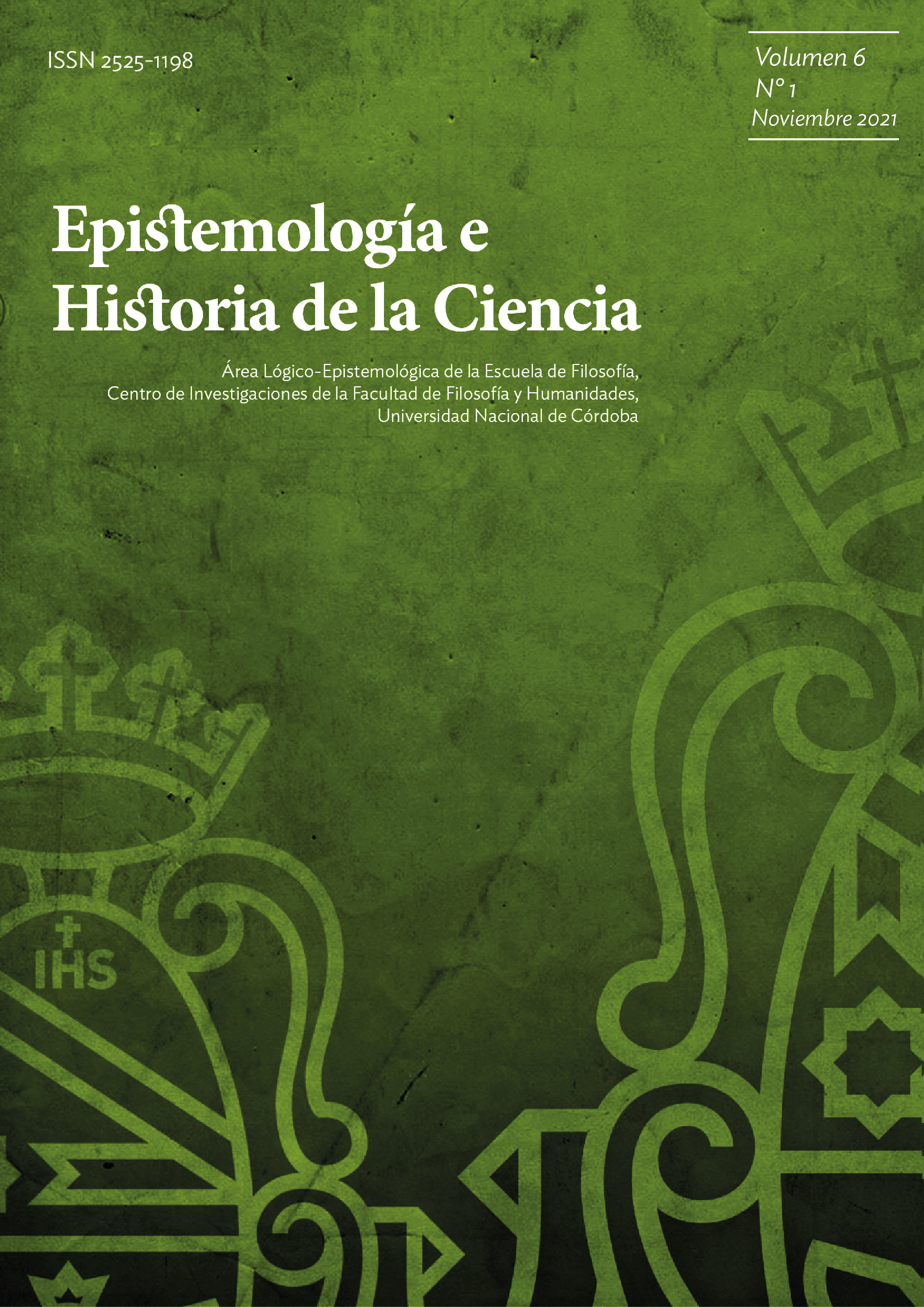¿Epistemological or historical?
The History and Philosophy of Science through a new tension
Keywords:
Historical Epistemology, Lorraine Daston, Lorenz Krüger, History and Philosophy of ScienceAbstract
Historical Epistemology (HE) is one of the most recent recognized programs in the History and Philosophy of Science, mainly since its refoundation from the creation of the Max Planck Institute for the History of Science. This new movement, which aims to involve both History and Philosophy in the study of scientific practice, has generated an atmosphere of discussion and some philosophers have exposed their concerns about it. The central tension that it caused involves a revival of an old questions about the nature of Science and which disciplines should take care of this fundamental question. This work has the purpose of identifying the philosophical background behind the HE label, in order to raise up a series of warnings about the new HE and the philosophical and political project that seems to be shadowed in the silence about that fundamental question.
References
Dear, P., & Jasanoff, S. (2010). Dismantling boundaries in science and technology studies. Isis, 101(4), 759-774.
Dear, P., Hacking, I., Jones, M. L., Daston, L., Galison, P. (2012). Objectivity in historical perspective. Metascience, 21, 11–39.
Daston, L. (2000). Introduction. The coming into being of scientific objects. En Biographies of scientific objects (pp. 1-14). Univ. of Chicago Press.
Daston, L. (2009). Science studies and the history of science. Critical inquiry, 35(4), 798-813.
Daston, L. (2017). Historicidade e objetividade. Liber Ars.
Daston, L., & Galison, P. (2007). Objectivity. Princeton University Press.
Foucault, M. (2003). La arqueología del saber. Siglo XXI.
Fuller, S. (1992). Reviewed Work(s): Essays on the Theory of Scientific Cognition by Jerzy Kmita and Jacek Holówka. Isis, 83(2), 373.
Gingras, Y. (2010). Naming without necessity. Revue de synthèse, tome 131, 6e série, n° 3, 439-454.
Gould, C. C., Cohen, R. S., (Eds.). (1994). Artifacts, Representations and Social Practice. Essays for Marx Wartofsky. Springer.
Hacking, I. (1999). Historical meta-epistemology. Abhandlungen der Akademie der Wissenschaften in Göttingen. Philologisch-historische Klasse, (231), 53-77.
Hacking, I. (2002). Historical ontology. En In the scope of logic, methodology and philosophy of science (pp. 583-600). Springer.
Kmita, J. (1991). Essays on the theory of scientific cognition. PWN-Polish Scientific Publishers.
Kmita, J. (1998). Problems in Historical Epistemology. PWN-Polish Scientific Publishers.
Krüger, L. (1978/2005). Does a Science need Knowledge of its History? En T. Sturm, W. Karl, & L. Daston. (2005). Why Does History Matter to Philosophy and the Sciences? Selected Essays of Lorenz Krüger (pp. 221-231). Walter de Gruyter.
Krüger, L. (1984). Why do we study. Philosophy in History: Essays in the Historiography of Philosophy, (1), 77.
Krüger, L., Daston, L., & Heidelberger, M. E. (1987). The probabilistic revolution, Vol. 1: Ideas in history; Vol. 2: Ideas in the sciences. The MIT Press.
Lecourt, D. (1987). Para una crítica de la epistemología. Siglo XXI.
Lecourt, D. (2009). Georges Canguilhem. Nueva Visión.
Nowak, L. (1980). The Structure of idealization. Towards a systematic interpretation of the Marxian idea of science. Synthese Library 139. Springer.
Rheinberger, H. (2010). On Historizing epistemology. An essay. Stanford University Press.
Richardson, R. J., Daston L., (2016). Kuhn’s Structure of Scientific Revolutions at Fifty. Reflections on a Science classic. University of Chicago Press.
Wartofsky, M. (1979). Models, Representations and the Scientific Understanding. D. Reidel Publishing Company.
Downloads
Published
Issue
Section
License
Copyright (c) 2021 Epistemología e Historia de la Ciencia

This work is licensed under a Creative Commons Attribution-NonCommercial-NoDerivatives 4.0 International License.
En todos los lugares donde aplique, esta obra está bajo una licencia Creative Commons Reconocimiento-NoComercial-SinObrasDerivadas 4.0 .
- Los autores/as conservarán sus derechos de autor y garantizarán a la revista el derecho de primera publicación de su obra, el cual estará simultáneamente sujeto a la Licencia de reconocimiento de Creative Commons que permite a terceros compartir la obra, siempre que se indique su autor y su primera publicación en esta revista.
- Los autores/as podrán adoptar otros acuerdos de licencia no exclusiva de distribución de la versión de la obra publicada (p. ej.: depositarla en un archivo digital institucional o publicarla en un volumen monográfico), siempre que se indique la publicación inicial en esta revista.
- Se permite y recomienda a los autores/as difundir su obra a través de Internet (p. ej.: en archivos digitales institucionales o en su página web) antes y durante el proceso de envío.
- Las licencias de las imágenes de terceros incluidas en los artículos pueden estar sujetas a otros términos; los autores/as son responsables de asegurar la veracidad de su origen, la información de la fuente original provista y su permiso de reproducción en esta publicación, que puede ser exclusivo.







